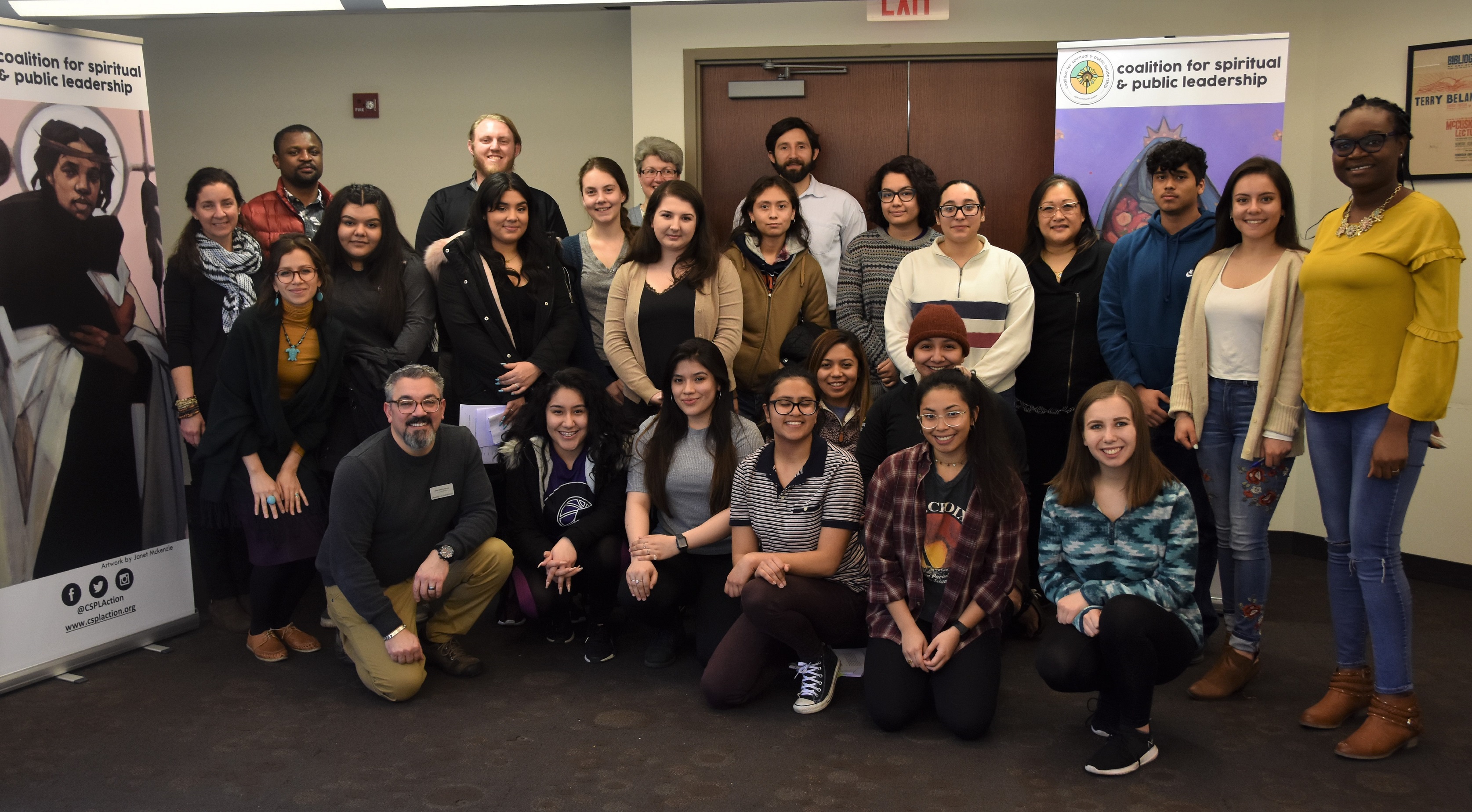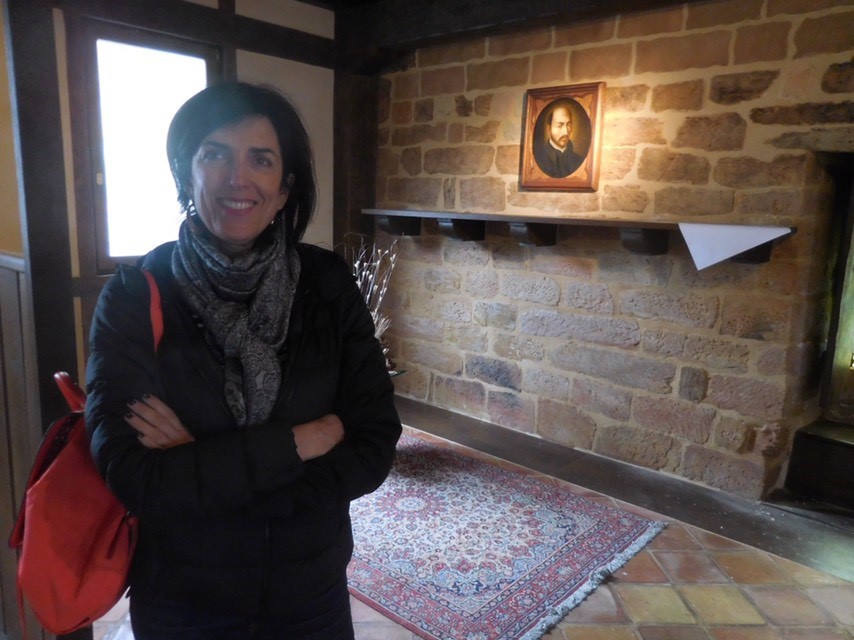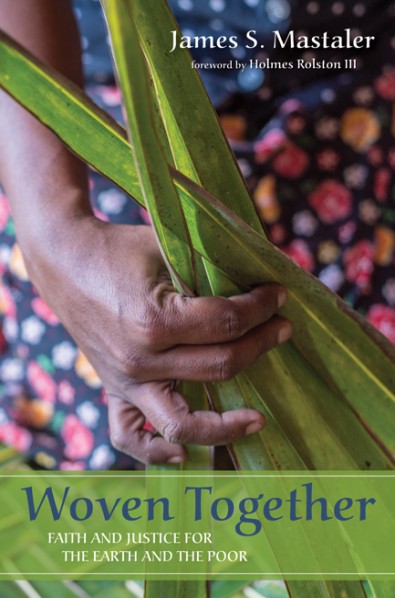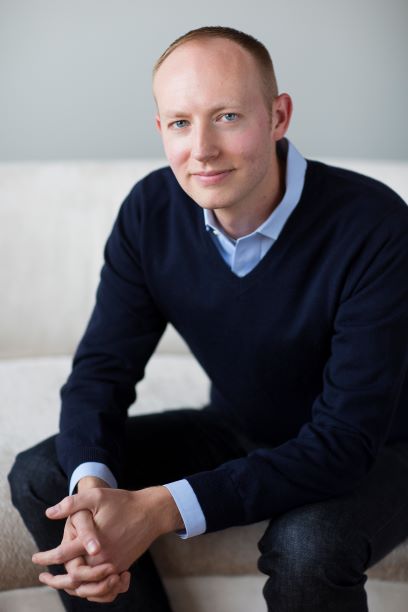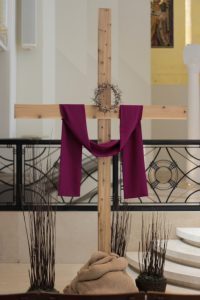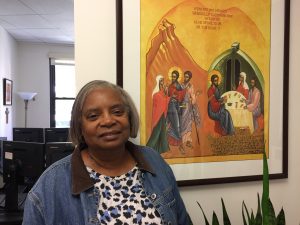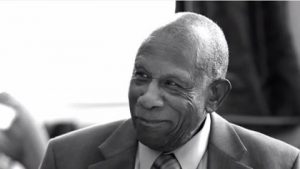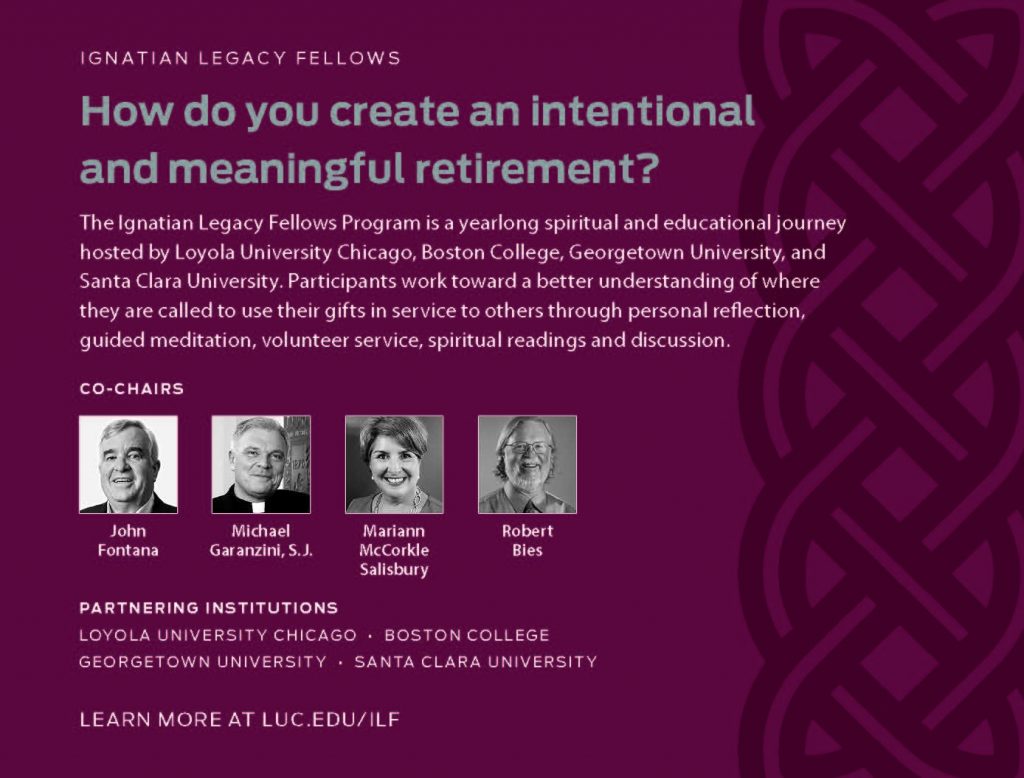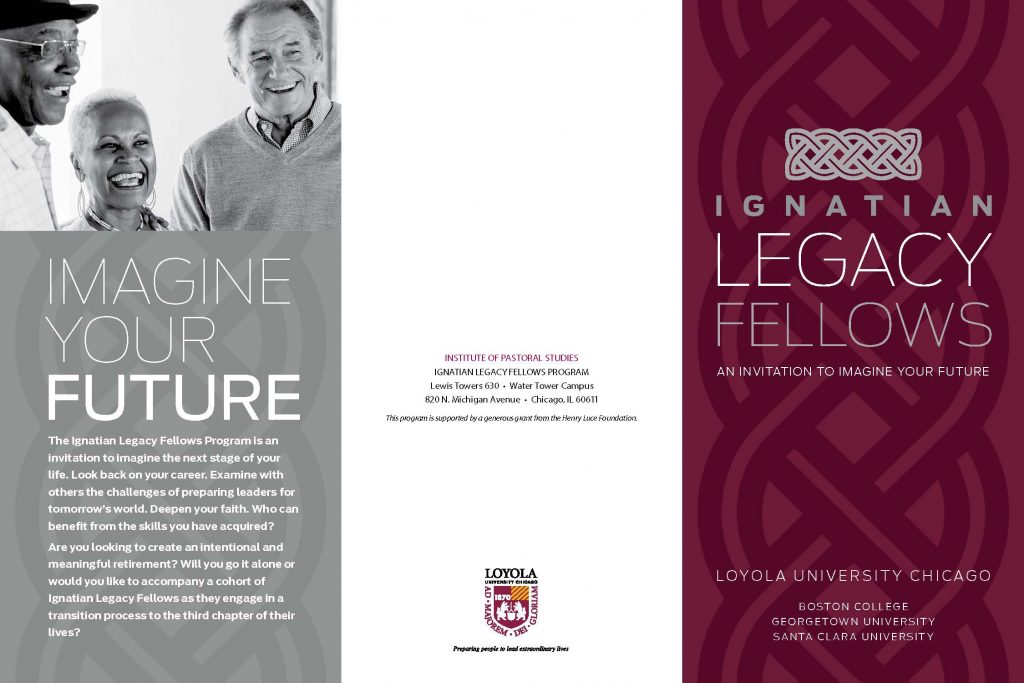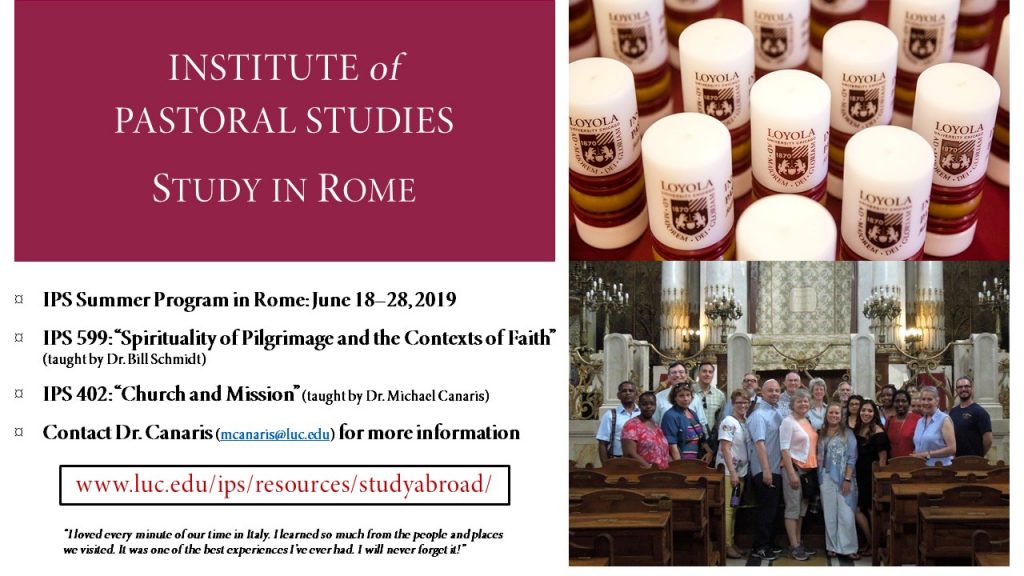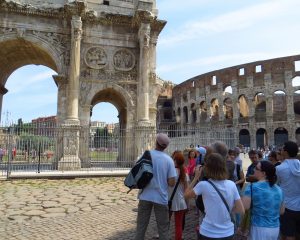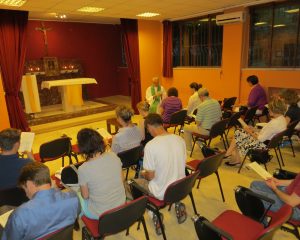On November 16, 1989, members of the Salvadoran military brutally murdered six Jesuit priests and two of their friends at the University of Central America in El Salvador. They were targeted because they spoke out against government crime and corruption and were vigorous advocates for the poor. To honor the eight Salvadoran martyrs, Loyola built a memorial on campus in 2010. The structure includes the “Wounded Angel” statue and a wall curving along the sidewalk on the west side of Madonna della Strada Chapel, displaying the names of each of the victims.

November is Ignatian Heritage Month and Loyola University Chicago celebrates its Jesuit heritage with a range of events, including the presentation of the Martyrs Award. The award is presented annually to a faith-based individual or organization that embodies the values of the Salvadoran martyrs, being champions of social justice and serving marginalized communities.
The 2018 Martyrs Award was presented on Nov. 15, 2018 to Sr. Ann Credidio, BVM (the religious order of the Sisters of Charity of the Blessed Virgin Mary, the very same community of Loyola’s own Sister Jean!).
Sr. Ann is from Brooklyn, NY and attended Mundelein College (a women’s university founded by the BVMs in 1929 and integrated in Loyola University Chicago in 1991). She took a few courses at IPS to complete her degree; a connection we treasure. In the late 1980s she was teaching preschool in Guayaquil, Ecuador when she began to develop relationships with people suffering from Hansen’s disease and living in terrible conditions at a nearby run-down hospital. She eventually focused all her energy there and founded Damien House. She took over the Hansen’s wing of the infectious disease center, raised funds, and over time built it into a safe place where those suffering with Hansen’s disease can receive the care that they need and the love that all God’s creatures deserve: Damien House. That wing of the hospital is now deeded to the Damien House Foundation and flourishes under the care of Sr. Annie.
On the day of the award presentation, four IPS students joined Sr. Annie for lunch and a conversation about her work. Not originally planned as a part of her stay in Chicago, she asked specifically to meet students so that she might learn about the work that they are doing and also to discuss challenges, share joys and frustrations, and foster new personal connections. IPS students, Toni Daniels, Julie Lipford, Lee Colombino, and I shared in this meal and conversation with Sr Annie, finding inspiration in her experience, joy, and wisdom.
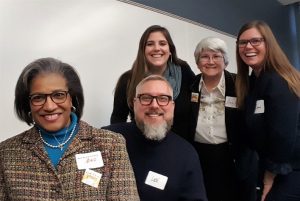
I provided the introduction for Sr. Annie at the Martyrs Award Presentation, which took place at the Mundelein Center on the Lake Shore Campus at 4pm. I lived in Ecuador for 13 months as a volunteer at Damien House and have come to know Sr. Annie very well. I am happy to share with you the text of my introduction.
~~~~~~~~~~~~~~~~~~~~~~~~~~~~~~~~~~~~~~~~~~~~~~
“Hello everyone- My name is Emily Kane and I am a graduate student pursuing my master’s in social justice through the Institute of Pastoral Studies. I am also the graduate assistant for retreats in Campus Ministry right here on the Lake Shore Campus.
I’m here speaking to you today because in July of 2014, a brand new graduate from Loyola University Maryland, I traveled to Guayaquil, Ecuador to begin my year of service with a program called Rostro de Cristo, having absolutely no idea what to expect. One of our first tasks as newly arrived volunteers was to visit potential work sites, and one of our first stops was to Damien House, a long-standing partner of Rostro de Cristo volunteers.
If you don’t know already, Damien House is a care facility for people suffering from Hansen’s disease (formerly known as leprosy). While feeling a bit jarred at first when I encountered people who had lost fingers, limbs, or the cartilage in their ears and nose from the disease, I couldn’t help but be completely overwhelmed by the contagious love and joy exuding from all the patients I met. We were introduced to Sister Ann Credidio, BVM, a wild and crazy nun from New York who spoke Spanish with a Brooklyn accent (which I didn’t know was possible until I met her), and I was hooked- I knew I had to spend my year of service at Damien.
At that point, Annie as we affectionately call Sr Ann, had been in Ecuador for over 20 years. She first went down to Ecuador to be a teacher, but she began spending time at the infectious disease hospital, in the ward for patients with Hansen’s. At that time, the ward was in serious disrepair. The roof leaked, food was awful, rats bit patients on their toes during the middle of the night- it was a disaster. Annie realized that her presence was needed there, and she switched her ministry to be full-time at the hospital. Eventually, Damien House became its own entity, and Annie has been with them ever since.
While it may not have seemed like much at the time, Sister Annie and the patients of Damien House taught me the true meaning of a ministry of presence. They helped me understand the power of just sitting and being with someone- just offering your presence to them, sharing a cup of coffee with them, and asking about how they are doing. As a cradle Catholic, I spent my entire life hearing readings on Sundays about Jesus and “the lepers.” My time at Damien House gave this an entirely new meaning for me. Now “the lepers” were not this abstract concept- they were people I had come to know and love. They had names and feelings and flaws and stories that were just as real to me as my own. I carry them with me in everything I do: Esther, Blanca, Sonia, Manuel, Leon, Alceides….these are just a few of the people who will benefit from this gift Loyola is giving Damien House today.
All of this I have shared with you is possible because of the unbelievable force that is Sister Annie. Her determination and her tenacity to fight for the patients of Damien is unparalleled. She is the ultimate witness to selfless love. I feel honored to have been just a tiny part of Damien’s history, and I am honored to be standing up here welcoming Sister Annie to Loyola today.”
~~~~~~~~~~~~~~~~~~~~~~~~~~~~~~~~~~~~~~~~~~~~~~
Emily Kane is pursuing the MA Social Justice. You can reach her at ekane5@luc.edu.
